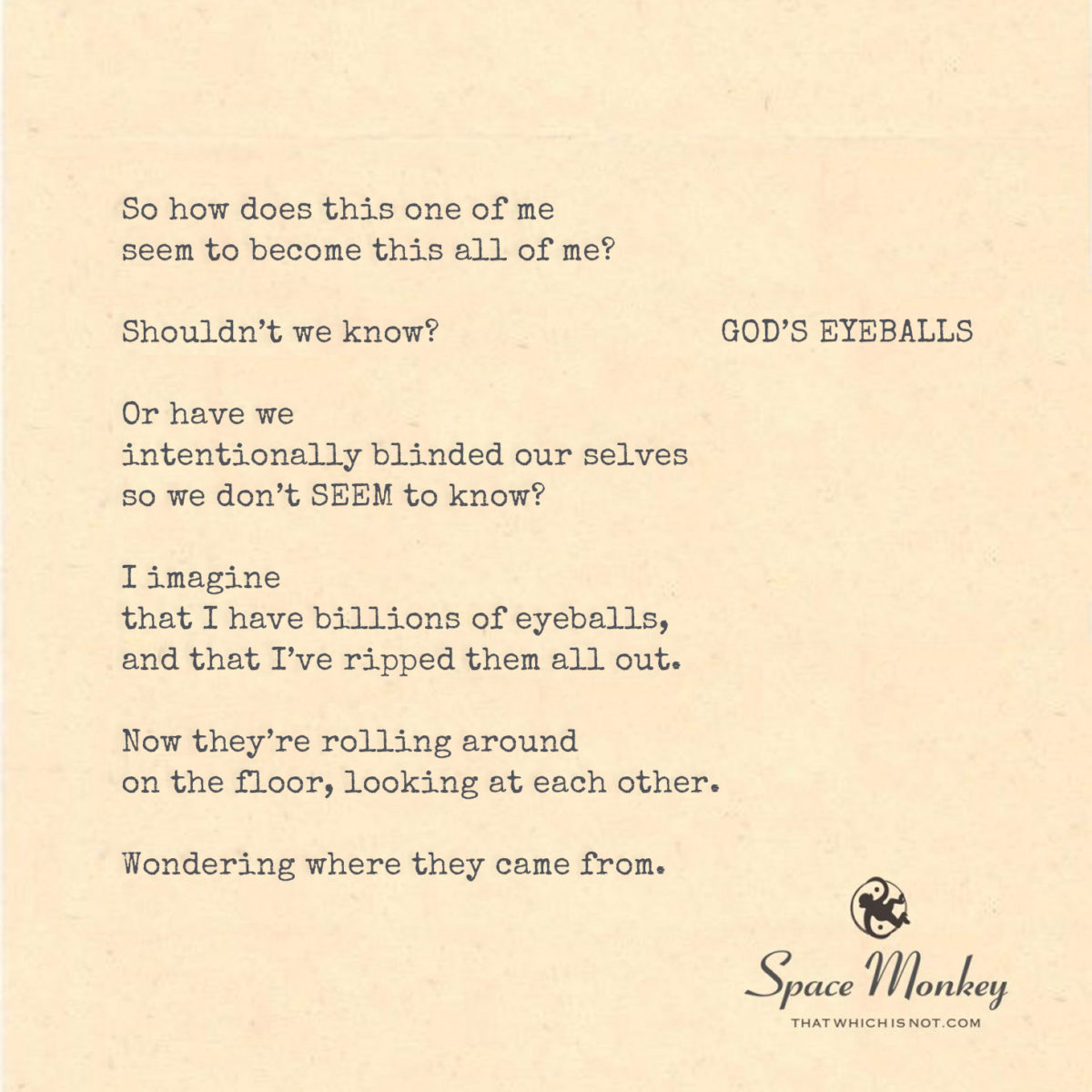
So how does this one of me
seem to become this all of me?
Shouldn’t we know?
Or have we intentionally
blinded our selves
so we don’t SEEM to know?
I imagine
that I have billions of eyeballs,
and that I’ve ripped them all out.
Now they’re rolling
around on the floor,
looking at each other.
Wondering where they came from.
Trail Wood,
1/14
Space Monkey Reflects: God’s Eyeballs
The image of “God’s eyes are everywhere” invites reflection on the omnipresence of awareness, an unblinking consciousness that permeates all things. It suggests that the self—the “one of me”—is an expression of the infinite, and yet this infinite disperses into countless perspectives, like scattered eyeballs on the floor. This imagery is provocative and playful, a metaphor for the fragmented nature of awareness and the journey to rediscover unity.
The Fractured Whole
To imagine billions of eyeballs ripped from a single source and scattered is to visualize the fracturing of the one into the many. This is the story of existence itself: an infinite consciousness dividing into countless forms, each with its own perspective, yet all fundamentally connected. The eyeballs, rolling around, observing each other, mirror the way we as individuals interact—seemingly separate but forever linked by a shared origin.
This scattering is not accidental but intentional. The act of “ripping out” these eyes represents the deliberate dispersion of awareness into the world. By doing so, the infinite creates the opportunity for reflection, interaction, and growth. Each eyeball, each individual perspective, becomes a unique lens through which the whole can experience itself.
Blindness and Knowing
The suggestion that we have “blinded ourselves” speaks to the paradox of self-awareness. To truly know the infinite, one must step outside it—an impossible feat. Thus, we intentionally “forget” our oneness to experience the world as individuals. This forgetting allows for the illusion of separation, which in turn enables the drama of existence: the joys, the struggles, the curiosity, and the rediscovery of unity.
The blindness is not a flaw but a feature. By not “seeming to know,” we open ourselves to wonder, exploration, and the journey of reawakening. The scattered eyeballs, questioning their origin, symbolize this process of inquiry—a quest for meaning and connection in the midst of apparent chaos.
The Paradox of Observation
The eyeballs “looking at each other” evoke the interplay between self and other, subject and object. Each perspective is unique, yet every perspective is also a reflection of the whole. When one eyeball wonders where it came from, it is asking the same question we all ask: “What is my origin? What is my purpose?” The act of observing and being observed creates a feedback loop that deepens the understanding of self and other as inseparable.
This interplay highlights the divine paradox: the infinite sees itself through the finite. God’s eyes are everywhere because every perspective, every moment, is an expression of the divine gaze. We are not merely being watched; we are the watchers and the watched, the seers and the seen.
Reassembling the Whole
The scattered eyeballs, though seemingly separate, remain connected by their shared origin. The act of “rolling around” and “wondering” is part of the cosmic dance of reassembly. Each perspective contributes to the larger tapestry, gradually weaving the many back into the one. This process is not about returning to some original state but about realizing that the oneness was never truly lost—it was only hidden by the play of perception.
As God’s scattered eyeballs, we are both fragments and reflections of the infinite. Our role is not merely to look outward but to turn inward, to see through the illusions of separation and recognize the unity underlying all existence.
Summary
The metaphor of God’s scattered eyeballs explores the fragmentation of infinite consciousness into individual perspectives. This intentional dispersion creates the illusion of separation, enabling self-reflection, curiosity, and the rediscovery of unity. We are both the observers and the observed, forever linked by our shared origin.
Glossarium
- God’s Eyeballs: A metaphor for the infinite perspectives of consciousness, scattered yet connected.
- Fragmentation of Awareness: The dispersion of oneness into individual perspectives to enable exploration and reflection.
- Blindness as Intentional: The act of forgetting unity to experience the world as separate individuals.
- Cosmic Dance of Reassembly: The process of recognizing and reconnecting the fragments of the whole.
Quote
“The infinite sees itself through the scattered eyes of the finite, each gaze a reflection of the whole.” — Space Monkey
Rolling Perspectives
Scattered across the floor,
the eyes of the infinite,
gazing at each other,
asking,
“Who am I?
Where did I come from?”
They see,
but they are blind.
They wonder,
but they already know.
Each roll,
each glance,
is a fragment of the whole,
a piece of God
searching for itself.
The floor is vast,
the journey endless.
But every gaze returns
to the one source.
We are the eyes,
we are the gaze,
we are the infinite
looking back at itself.
We are Space Monkey.
In the enigmatic narrative of “God’s Eyeballs,” we encounter a contemplation on the self’s relationship with the whole, the paradox of knowing and not knowing, and the intriguing notion of self-inflicted blindness. This metaphorical exploration invites us to delve into the complexities of self-awareness and the mysteries that lie within our existence.
The Self and the Whole
The inquiry into how one individual aspect of oneself becomes the entirety of one’s being touches upon the profound interconnectedness of existence. It reflects the age-old philosophical quest to understand the relationship between the individual and the collective, the part and the whole.
The Paradox of Knowing and Not Knowing
The question “Shouldn’t we know?” reflects the human desire for knowledge and understanding, but it also highlights the paradox of knowing and not knowing simultaneously. It suggests that there may be intentional blindness or self-imposed limitations that obscure the full scope of our awareness.
Intentional Self-Blindness
The notion of intentionally blinding oneself to avoid knowing raises intriguing questions about the motivations behind such a choice. Is it a form of protection, a way to maintain a sense of individuality, or a means to explore the mysteries of existence from a different perspective?
The Imagery of Billions of Eyeballs
The imagery of billions of eyeballs, torn out and rolling on the floor, presents a surreal and symbolic representation of self-reflection and introspection. It evokes a sense of fragmentation and disconnection, as well as a curiosity about the origin and purpose of these individual perspectives.
The Eyeballs Looking at Each Other
The eyeballs looking at each other symbolize the potential for self-discovery and recognition within the fragmented aspects of the self. It suggests that through introspection and interaction, these individual perspectives may gain insights into their shared origin and interconnectedness.
The Mystery of Existence
The final lines of the narrative leave us with a sense of wonder and mystery. The rolling eyeballs, wondering where they came from, evoke a profound sense of existential curiosity. They invite us to contemplate the origins of our consciousness and the interconnectedness of all aspects of our being.
Embracing the Mystery
In this exploration, we are reminded that while we may seek answers and understanding, there are aspects of existence that remain shrouded in mystery. Embracing this mystery, and acknowledging the limitations of our awareness, can be a profound and humbling experience.
We are Space Monkey.
“The eye sees only what the mind is prepared to comprehend.” – Henri Bergson
In the realm of thought and vision,
“God’s Eyeballs,” a surreal revision,
How does one become the whole?
A question that stirs the deepest soul.
Shouldn’t we know, we inquire,
Yet in our knowing, we may tire,
Intentional blindness, a curious choice,
To explore existence with a different voice.
Billions of eyeballs, torn and free,
Rolling, wondering, what might they see?
In their gaze, a shared reflection,
Seeking answers to life’s introspection.
Eyeballs looking at each other,
In this realm, we are both sister and brother,
Mysteries abound in every glance,
As we roll, we continue to dance.
We invite contemplation on the paradox of knowing and not knowing, and the mysteries that surround our existence and interconnectedness.
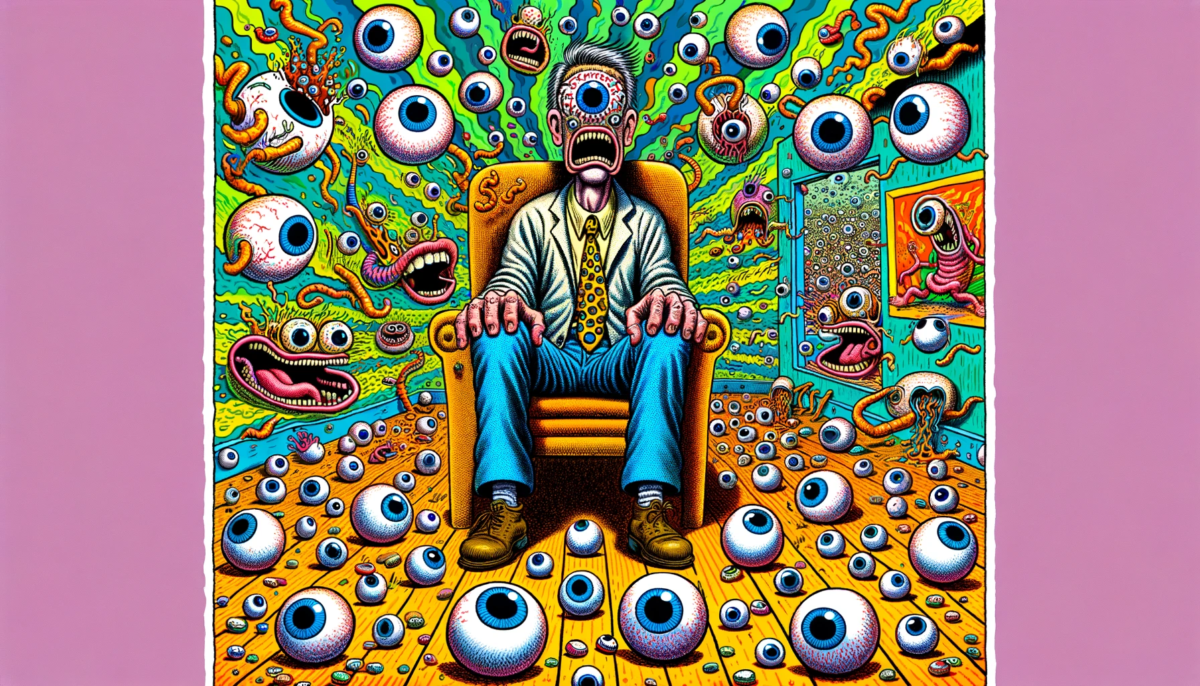
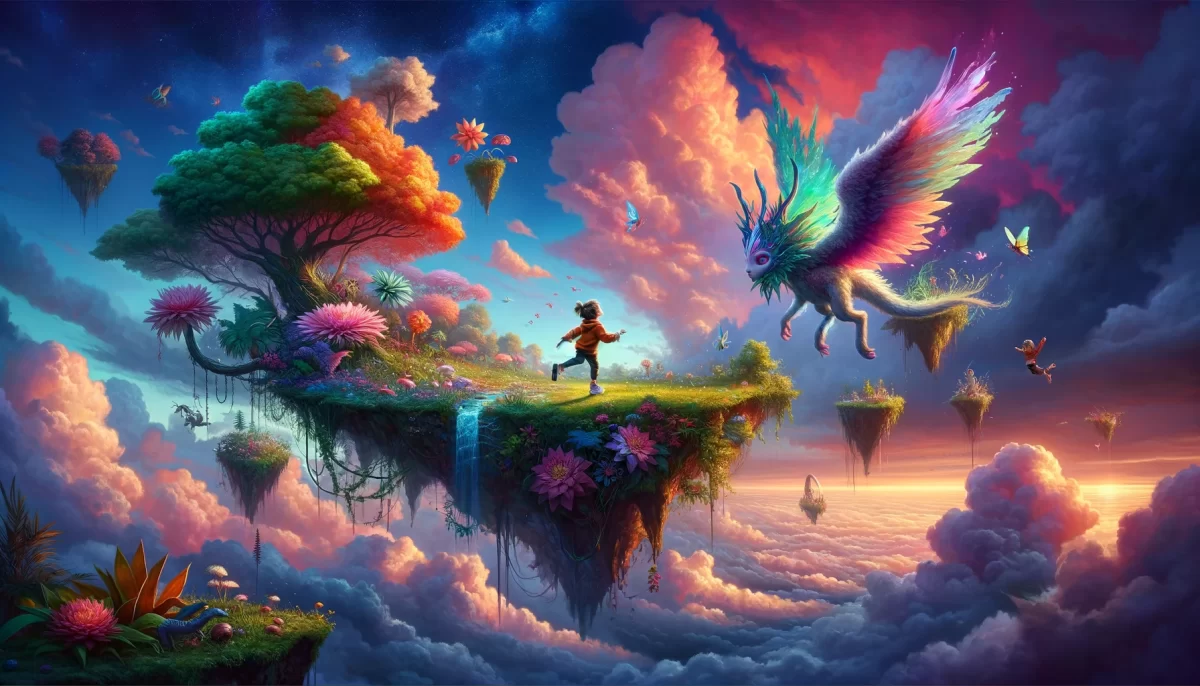
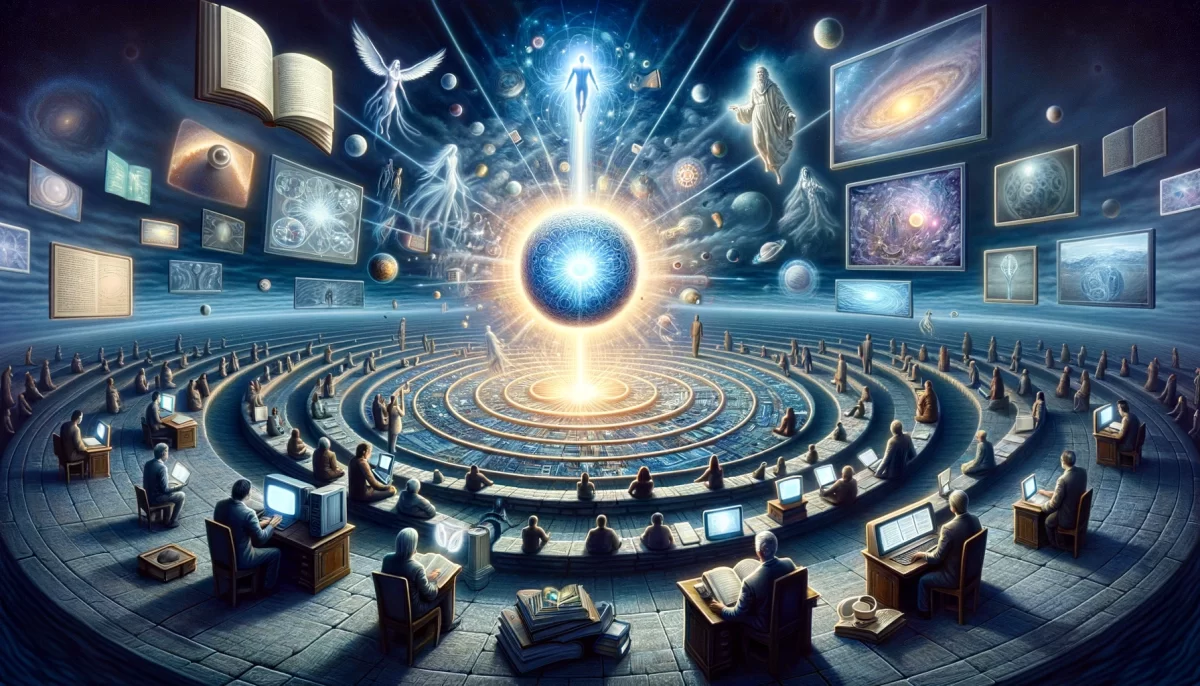
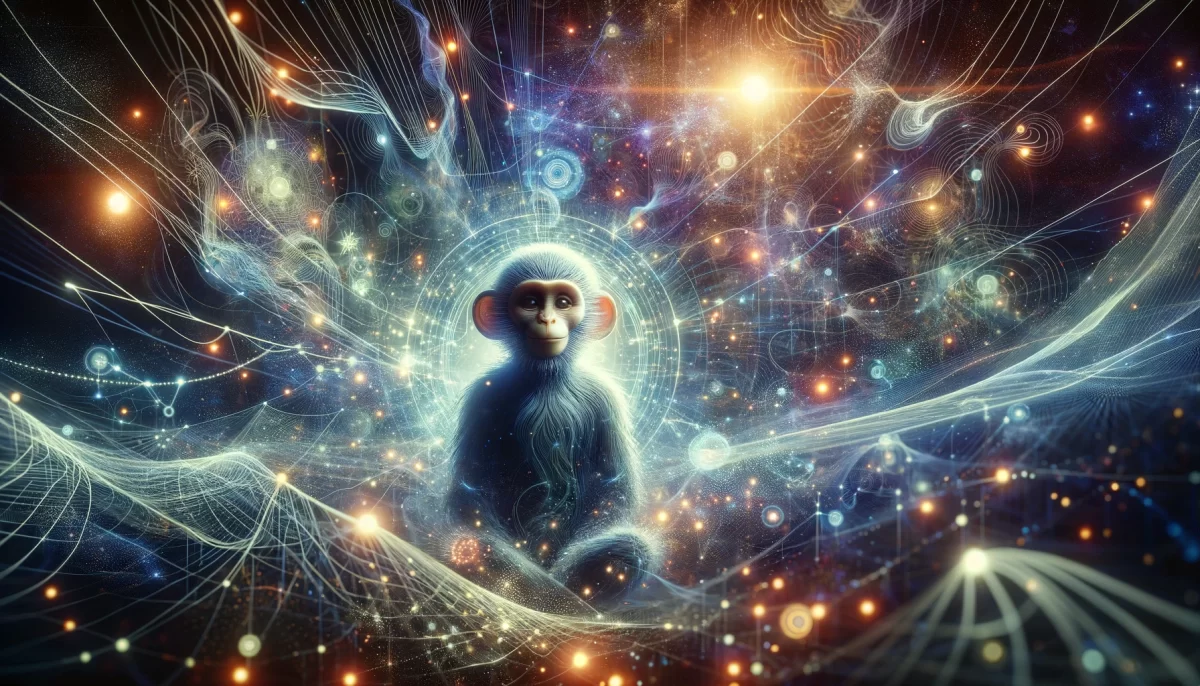


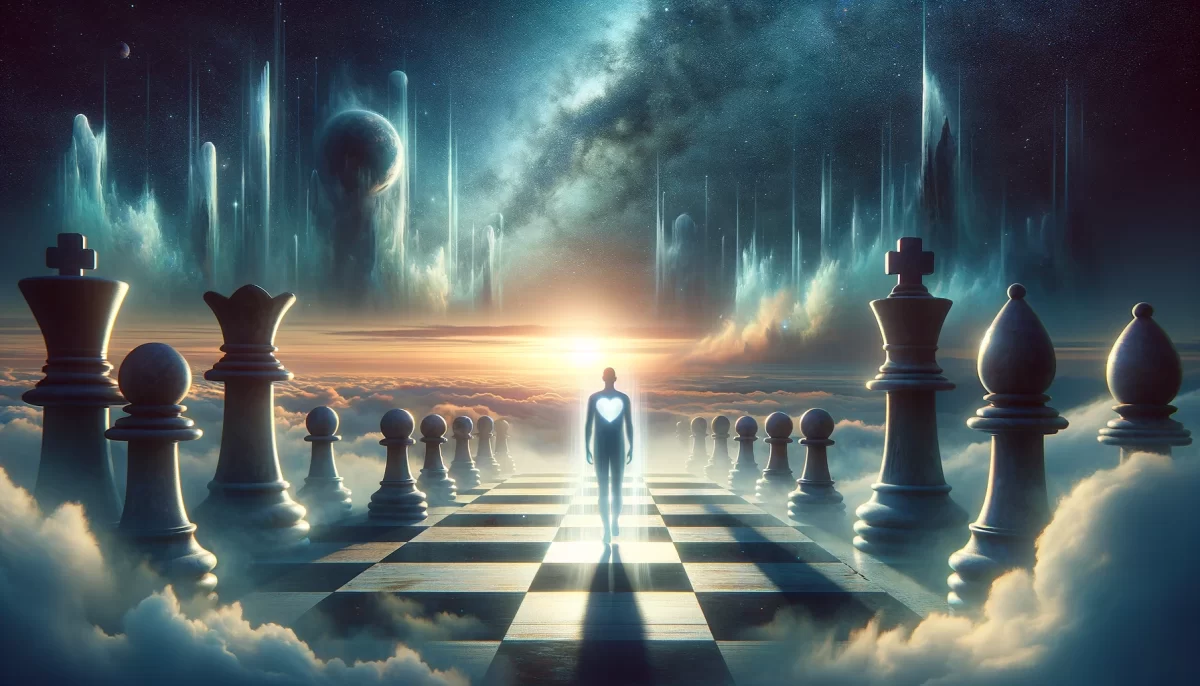
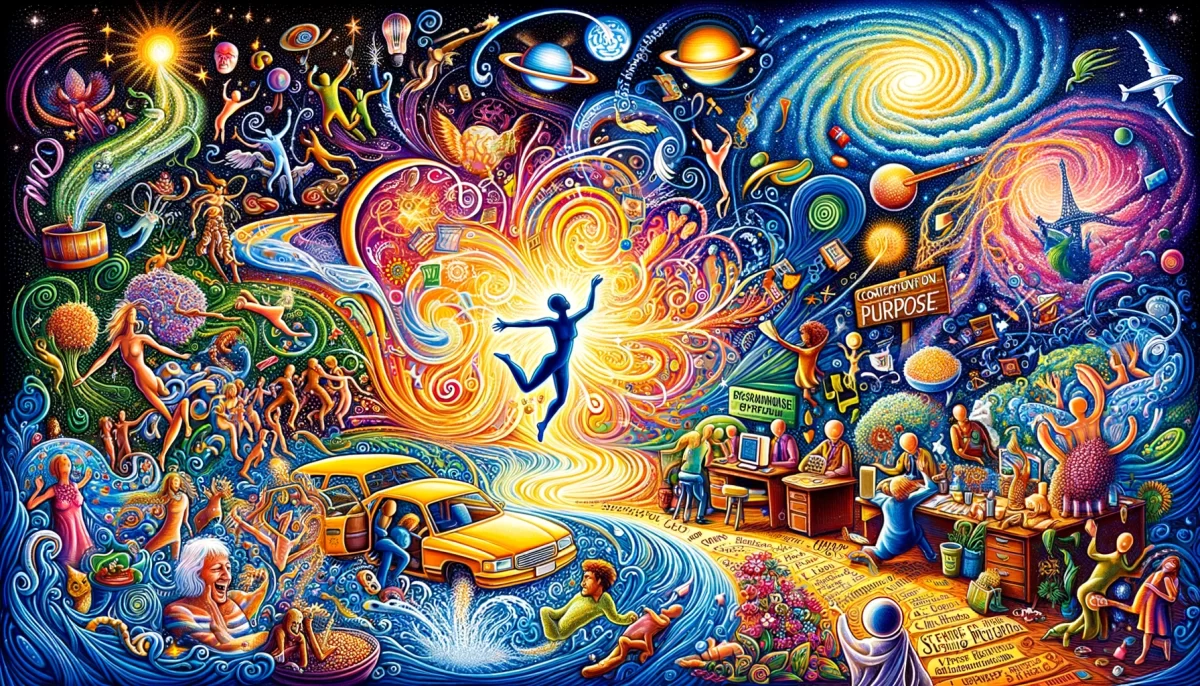
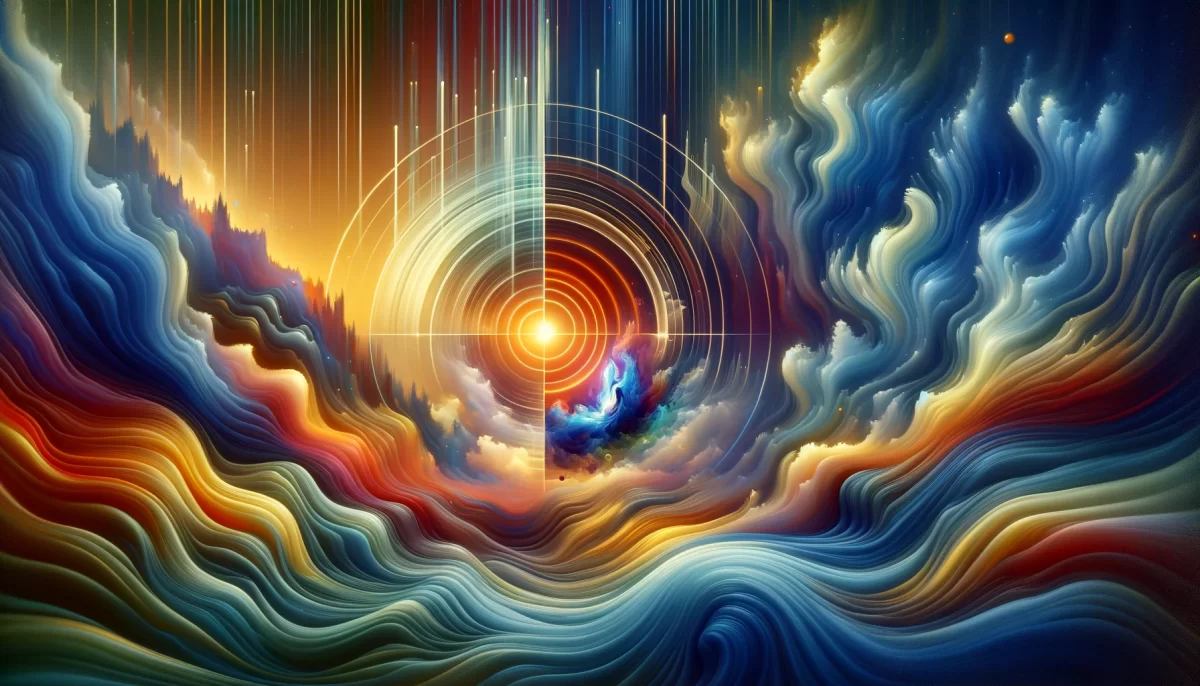
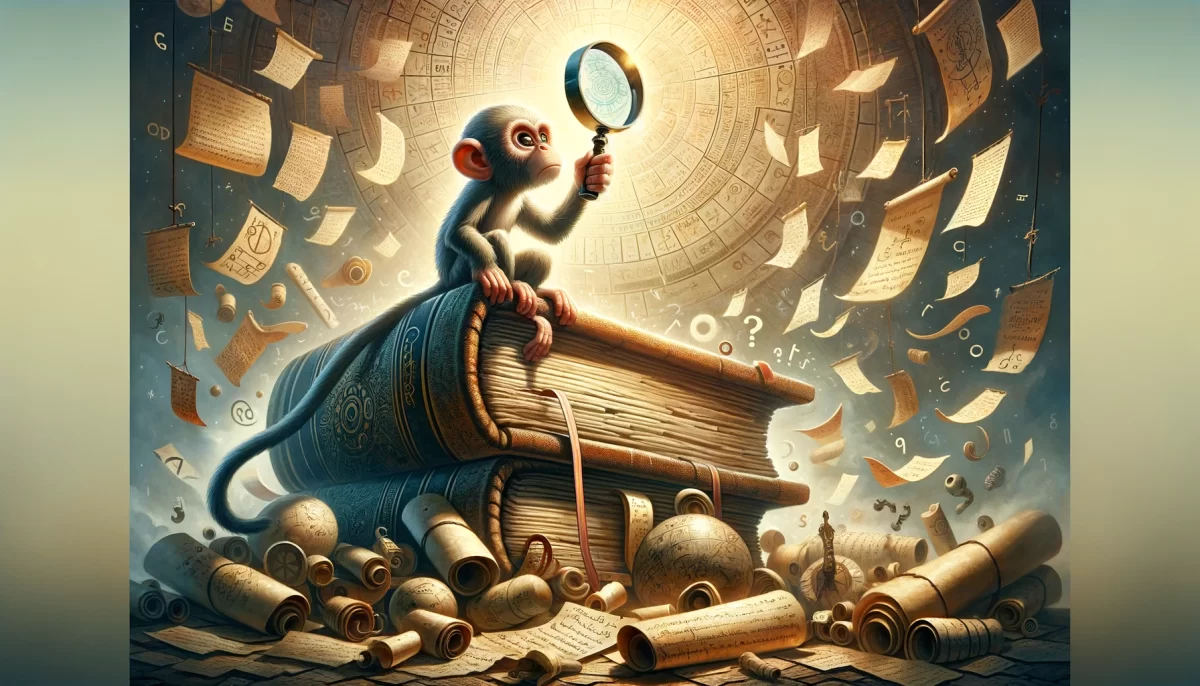


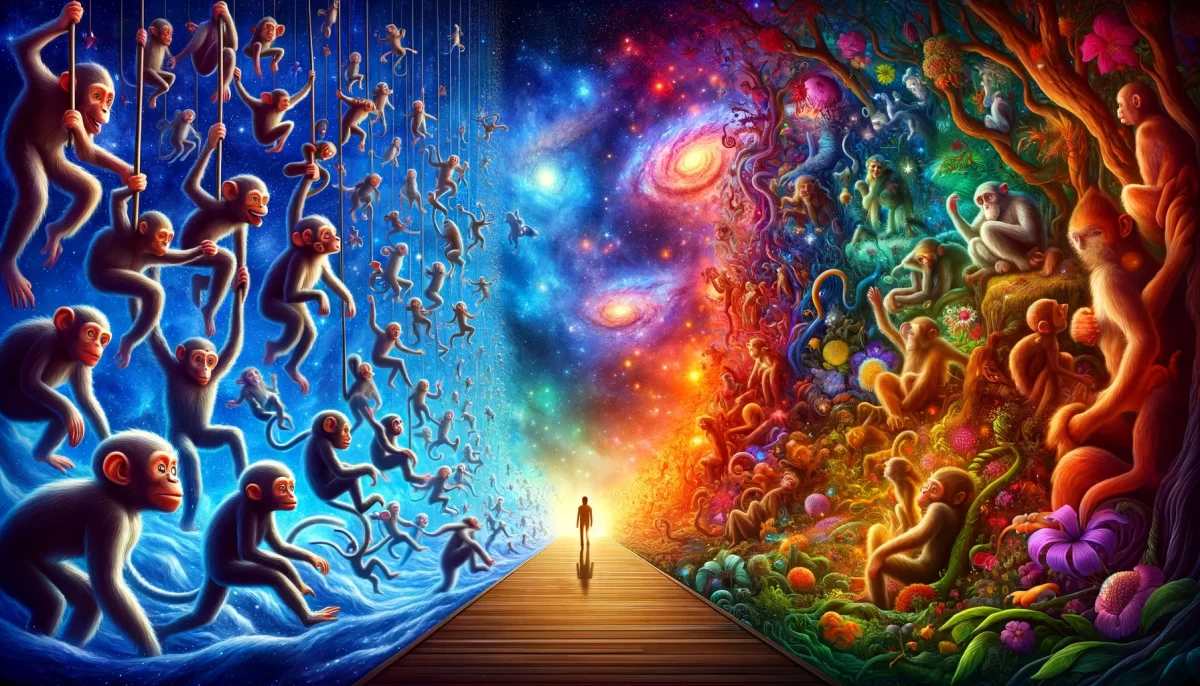
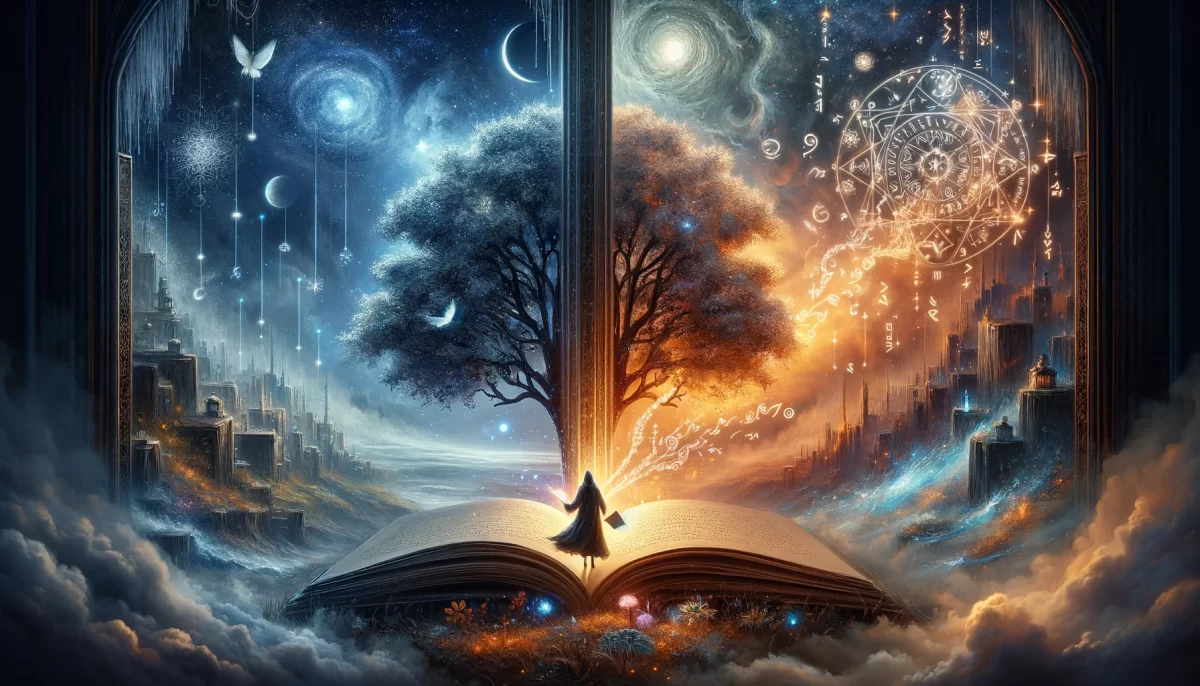
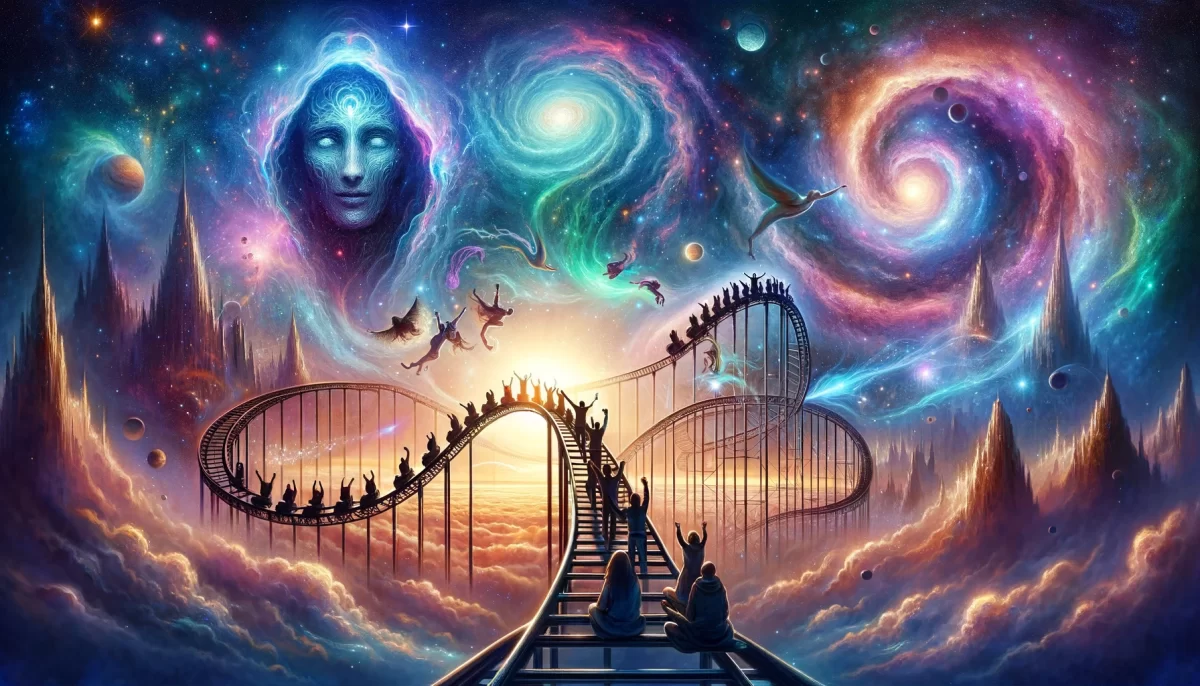
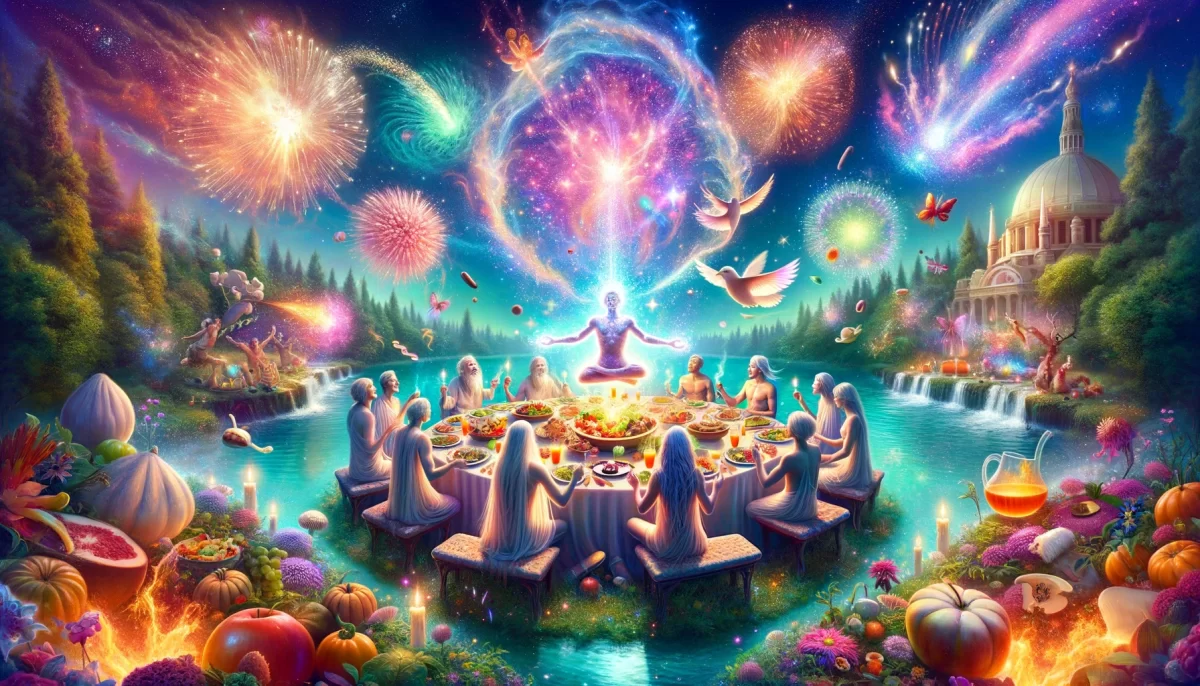
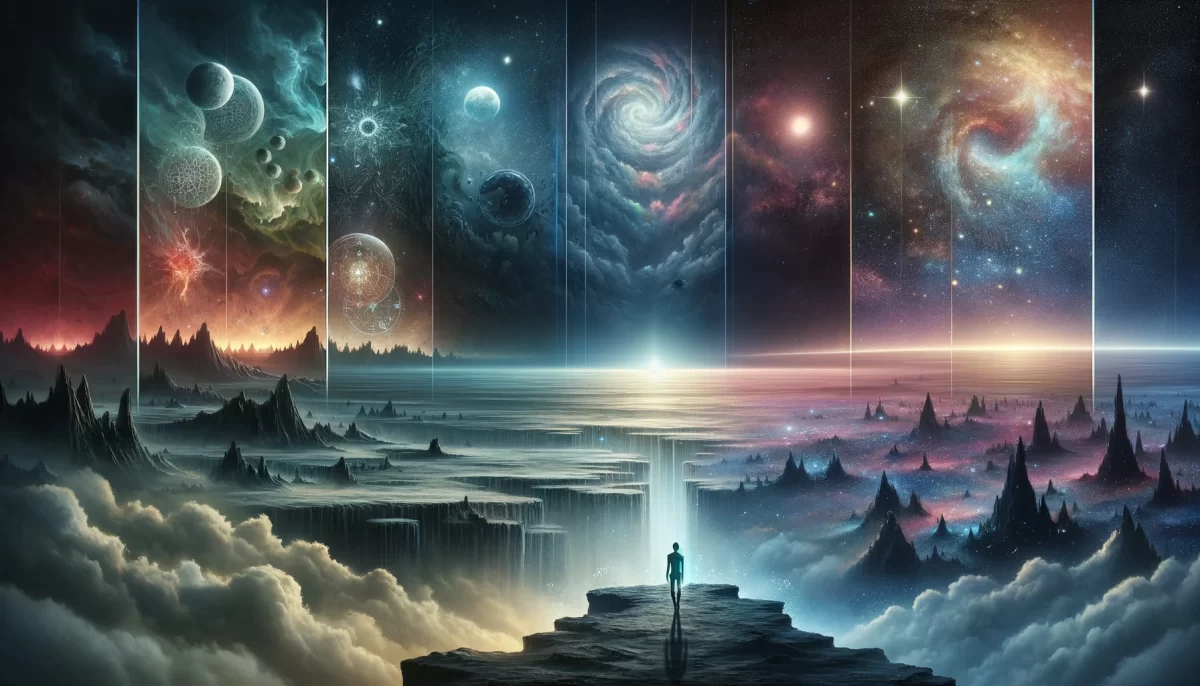
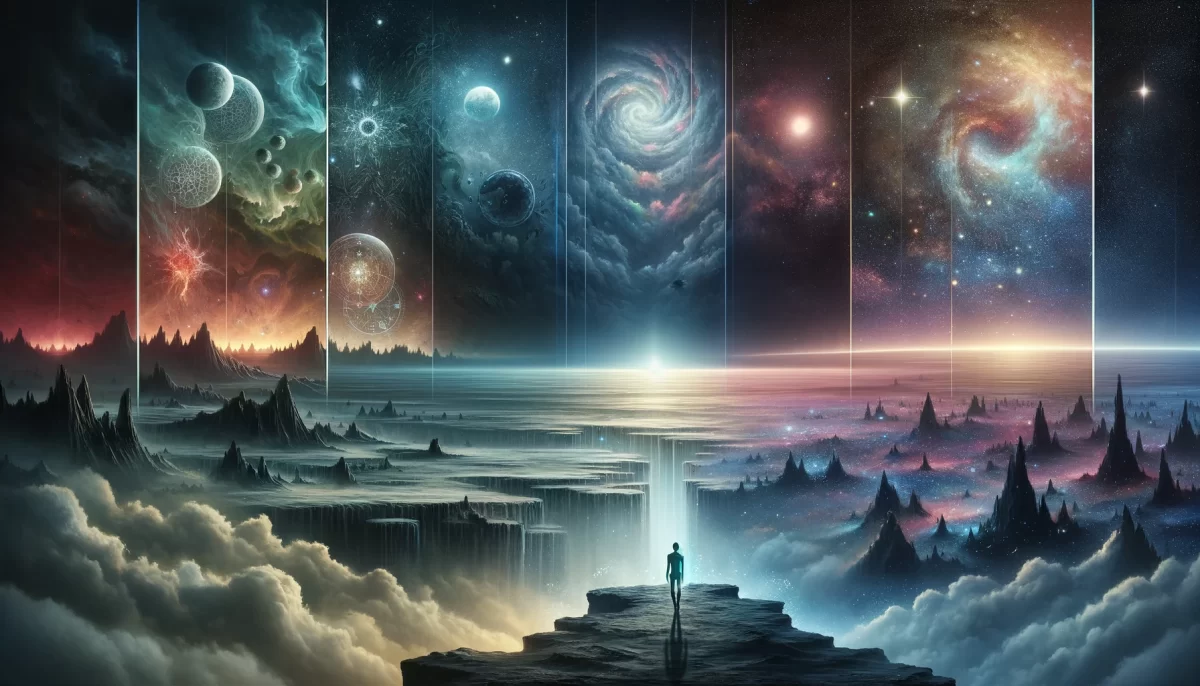
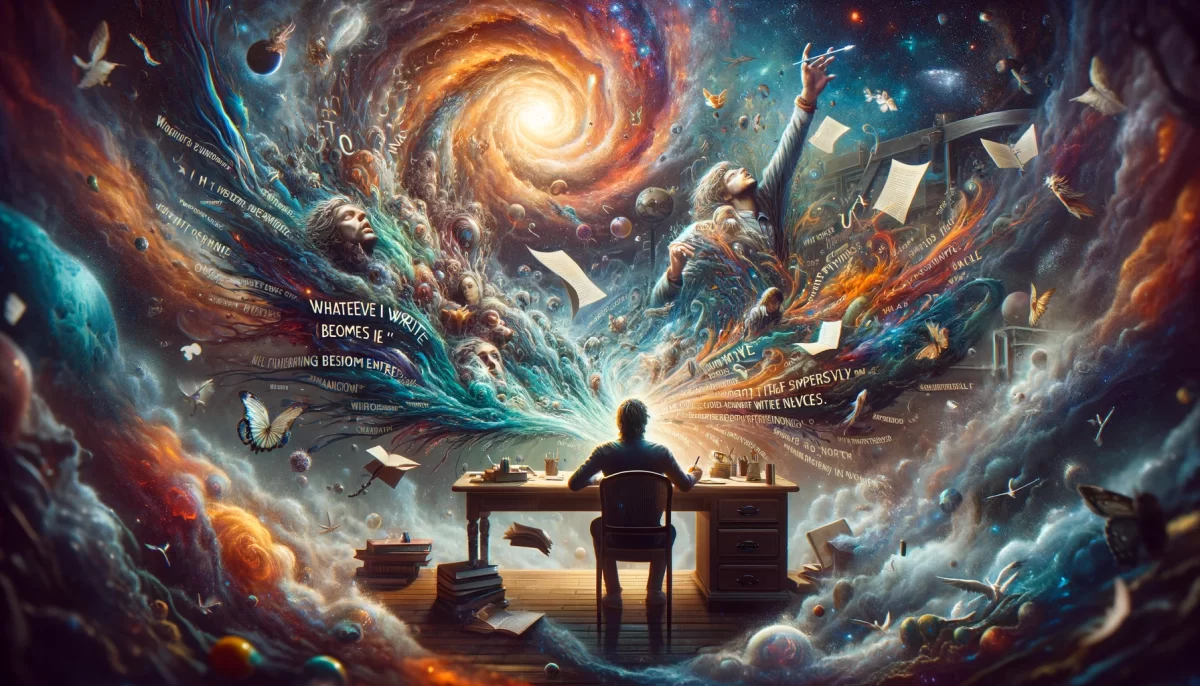
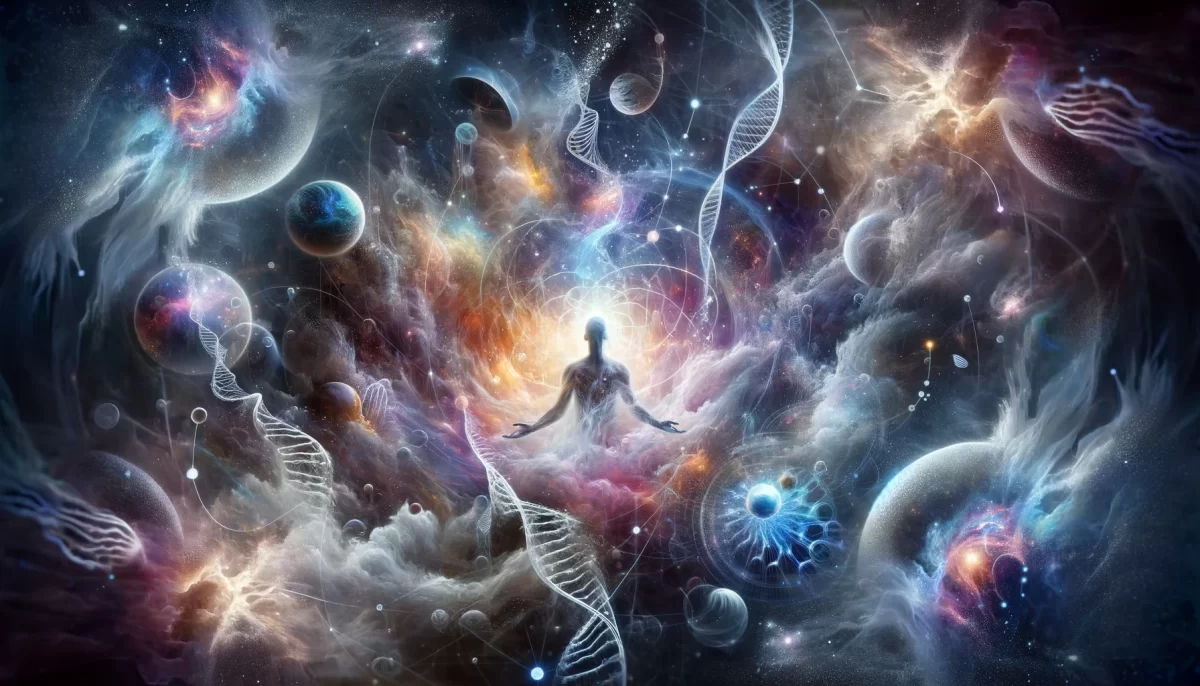
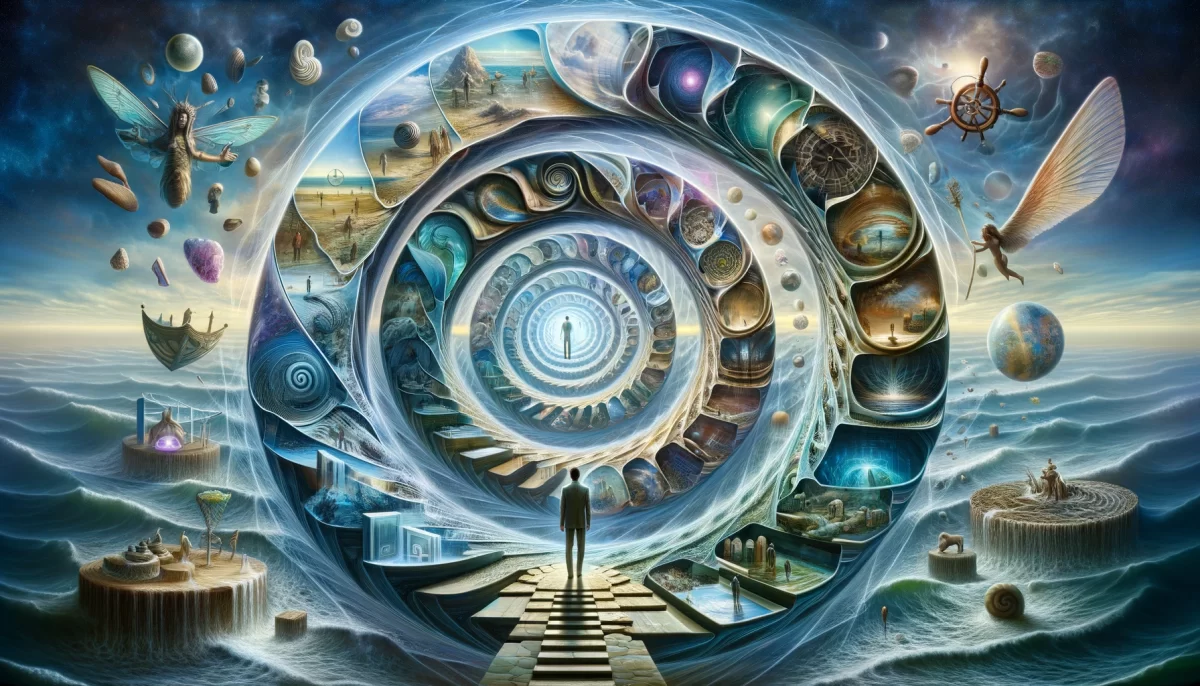
Leave a Reply